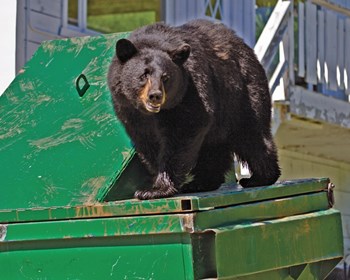
Ah, the return of spring and our feathered friends who make this season so special! Time to break out another bag of seed and fill up the bird feeder as the year-round bird population is joined by the returning migrants. Or is it? If your condo is close to woodlands, or in less settled regions of New England, birds may not be the only thing benefiting from your generosity. In recent years, more and more bears have been munching on seed put out for birds, creating problems for both humans and the lumbering creatures. Adding to the problem are unlocked dumpsters, creating another source of bear food.
As the bears have become increasingly dependent on humans for food in recent years, they’ve grown in numbers and become “habituated” to humans, associating them with food. It’s a dangerous development.
‘Suburban Bears’
With all the eating going on, bears living near humans have become heavier and have been dubbed “Suburban Bears,” says Marion Larson, an information and education biologist with the Massachusetts Division of Fisheries and Wildlife. “They’ve been living high off the hog and are extremely fat… The suburban bears are very heavy compared to their cousins who live 10 miles out of town in the woods,” says Larson.
Some of the bears are getting so fat they’re not even bothering to hibernate, says Larson, who notes that hibernation is not weather-related as much as a response to a lack of food in the wintermonths.
In Northampton, Massachusetts, for example, “the bears have gotten quite used to people and in some cases they are actually hibernating under people’sporches,” says Larson.
And these fatter bears are bearing more cubs, resulting in the need to forage for more high-energy food – the kind they get from humans.
“When happens is it becomes a vicious cycle,” says Andrew Timmons, a Bear Project leader with the New Hampshire Fish and Game Department. “Once she has more cubs... once she’s caring for that amount of cubs it perpetuates the [feeding] behavior because the nutritional demands are that much higher and it will force her to constantly search for the highest quality food she can find and some times of the year, that’s the kind the bears find in someone’s backyard,” says Timmons. “Black oil sunflower seed, which is available in many backyards, has a higher nutritional value than many foods you’ll find in thewild (like nuts and acorns),” he says.
Solutions
The solution to the bear problem mostly involves educating condo owners about bird feeders. The first thing bird lovers can do is put out birdseed only from December 1 to March 31 – when bears are hibernating.
Some bird lovers, says Timmons, think they can outsmart the bears by pulling the bird feeder in at night and only putting them out during the day. “The bears quickly learn the routine and start coming during the day,” he says. Also stymieing any workarounds with bird feeders, says Timmons, are the phenomenal memories of bears, even after hibernating for months. “Bears remember these spots (where bird feeders are) from year to year where they’ve gotten seed from in the past, so it’s hard to get away from leaving them up outside of those dates.”
So what should bird lovers do who still want to see their beloved creatures year round? Bird lovers are “just going to have to work a little harder to see thebirds in their back yard,” says Larson.
Bird baths will attract birds as will a variety of colorful plants like fuchsias, geraniums, or those that produce soft, fleshy fruits. Hummingbird feeders with sugar water are OK, but hanging suet is not. While there are no state laws in Massachusetts against feeding birds, Larson says that condos could consider passing rules and fining owners who set out bird feeders at the wrong time of year (from April 1 to November 29).
Also important in controlling bears is making sure the condo is using bear-proof steel dumpsters and residents are taking the time to lock them when not in use, says Larson. “When I lived in a condominium, one of the things that drove me crazy was the people who would empty their trash into the dumpster but they wouldn’t close the door,” says Larson. The best solution is steel dumpsters with locks on them that residents are trained to use. In addition, she says, “it's better to have a [strong] fence around a dumpster, not only because of the aesthetic, but it prevents animals from getting in.” Other animals that can be attracted to un-fenced dumpsters include raccoons, skunks, possums and coyotes, she says.
If They Persist
What should condos do if bears continue to come around the property – even after the condo has shut off thesupply of food?
Larson recommends driving bears off the property through harassment tactics. Noting that bears are generally afraid of people, she says that bears are“unimpressed” by yelling from inside a house “because they don't associate people with the building.”
But, she notes, “If you step outside [the building] that changes things. [The bear will think] ‘It’s a person, maybe I need to leave,’ says Larson. “Do whatever you can to scare him and make him wary by recognizing that people are a threat.” Ways of scaring the bears include banging pots and pans, yellingand other loud noises. One thing to avoid, she notes, is letting the family dog out to scare the bear, which could easily injure the household pet.
While harassment tactics are recommendedafter spotting a bear at the condominium, Larson says calling the local police or animal control officers is mostly a waste of time. “A lot of times when people call the police, a lot of times the bear is gone. Most of the time there is nothing to be done by us because we're not able to get to the bear. You're either going to drive the bear off, or it’s going to find its way off your property. There’s nothing we can do.”
If, however, the bear is in a heavily-traveled area, where a public safety issue could arise, Larson recommends calling the local fish and game officer, who will deal with the animal.
Also of concern are bears that have grown so used to human food that they start “breaking into sheds or houses” to get their preferred fare, says Larson. Bears like these are “a big problem” and should immediately be reported tothe local fish and wildlife department, she says.
Timmons says that New Hampshire residents facing bear problems can call the local office of the state Fish and Game Department. “If you know of any activity in your neighborhood that is leading to problems, we would like to know about it. If there’s any way we can help in reducing the chance of further problems, we can come out and make a site visit and offer suggestions.”
Leading the list of suggestions are the common-sense approaches in which human food is kept for human consumption and bears continue to eat their natural food. “It’s a responsible behavior to keep wildlife wild,” says Larson.
Jim Douglass is the managing editor of New England Condominium magazine.






Leave a Comment